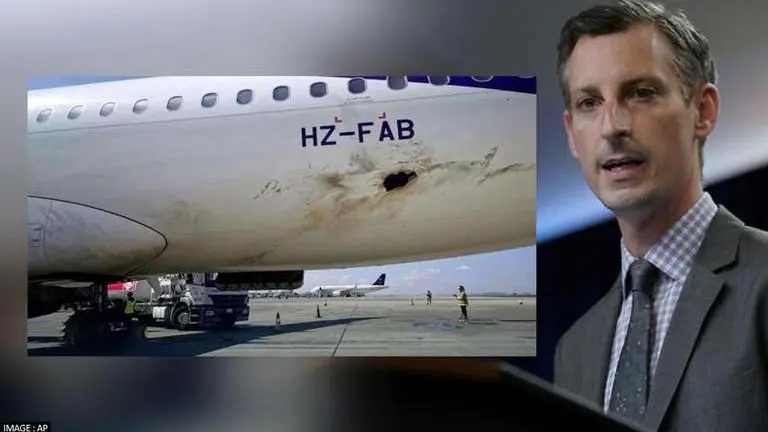Updated 10 October 2021 at 08:21 IST
US State Department condemns Houthi attack on King Abdullah Airport in Saudi Arabia
Brigadier-General Turki Al-Malki stated that the strike was carried out by a projectile that dropped on the King Abdullah Airport in Jazan
- World News
- 3 min read

The US State Department has denounced the Houthi assault on Saudi Arabia's King Abdullah Airport in Jazan on Saturday. The US State Department spokesman Ned Price criticised this incident on his Twitter and wrote that their sympathies are with the ten injured people who were simply trying to travel or earn a living.
We condemn the outrageous attack by Houthi forces on King Abdullah Airport in Jazan, Saudi Arabia. Our thoughts are with the 10 wounded civilians, who were doing no more than seeking to travel or make a living.
— Ned Price (@StateDeptSpox) October 9, 2021
Citing Saudi media, Xinhua news agency reported that a spokesman for the coalition, Brigadier-General Turki Al-Malki stated that the strike was carried out by a projectile that dropped on the King Abdullah airport. Nearly ten individuals were injured in the horrific incident. Brigadier-General further informed that among the wounded, there were civilian travelers which included six Saudis, three Bangladeshis, and one Sudanese.
Aerial attacks on the Airports of Saudi Arabia
According to Gulf News, which cited the alliance's spokesperson Turki Al Maliki, an explosives-laden drone attacked the airport in Jizan on October 8, Friday night, injuring ten passengers along with airport personnel. However, as per the initial reports, around 5 minor injuries were stated which occurred due to the falling debris caused by the projectile missile, but later, the state media updated the toll to ten. The force of the blast broke several glass windows at the airport, injuring a few people.
#Jazan #SaudiArabia #KSA 🇸🇦 pic.twitter.com/I6u9Gkh9vG
— Aleph א (@no_itsmyturn) October 8, 2021
Gulf News further reported that four workers at another Saudi airport were hurt on October 6, after Saudi forces stopped an explosive drone deployed by the Al Houthis. The Houthis conducted an Unmanned Aerial Vehicle (UAV) strike on Abha International Airport in the Kingdom's southern Asir Province on Wednesday.
Advertisement
The Conflict between Yemen and the Houthis
Al Houthis have frequently increased drone and missile assaults into Saudi Arabia in recent months. The conflict between Yemen and the Houthis began in September 2014, when an Iran-backed rebel took control over the capital city of Sanaa. With the help of former President Ali Abdullah Saleh, the insurgent group overthrew President Abed Rabbi Mansour Hadi's globally recognised administration and created the Supreme Political Council.
Since March 2015, Yemen-recognised government, supported by Saudi Arabia and the United Arab Emirates (UAE), has been at odds with the insurgent organisation. The struggle led the nation's previous president, Hadi, to escape to Saudi Arabia. Thousands of people have been killed in a succession of attacks and counter-strikes from the year 2015, pushing Yemen to the verge of starvation and humanitarian disaster. The fragile cease-fire aimed at ending Yemen's civil conflict has been shattered by ceasefire violations and intermittent military escalation on both sides.
Advertisement
(Image: AP)
Published By : Anwesha Majumdar
Published On: 10 October 2021 at 08:21 IST
